Man Yells At His Mom For Feeding His Cat Too Many Treats Despite Them Having An Agreement
Never let treats account for more than 10% of your cat’s daily calorie intake. In fact, aiming for 5% is preferable.
Cat treats are not comprehensive and balanced diets for cats, unlike commercially produced cat foods. Too many snacks can really throw off the normal meal’s nutritional balance.
Some well-liked cat treats have a protein content of 85%, which is far more than what is present in a suitable cat food formulation. If you give your cat too many treats, she won’t be as hungry for her usual meal.
This can cause her to become a "fussy eater," which makes it more difficult to use special diets should the need arise later in life to manage a disease nutritionally. It can also lead to a long-term nutritional imbalance.
Finally, too many treats significantly contribute to cats' being overweight and obese, both of which are becoming epidemic problems for household cats. This was clearly what the redditor in today’s story was trying to avoid, but his mother wasn’t making it any easier for him.
The OP adopted a street cat who is very friendly, and his mother took a liking to this cutie. She would always give the cat treats despite the fact that she and the OP had an agreement.
This action caused the cat to keep getting bigger and the OP wasn’t finding it funny anymore. Read on to find out how the entire story transpired.
The Headline...

I want to keep him as healthy as possible
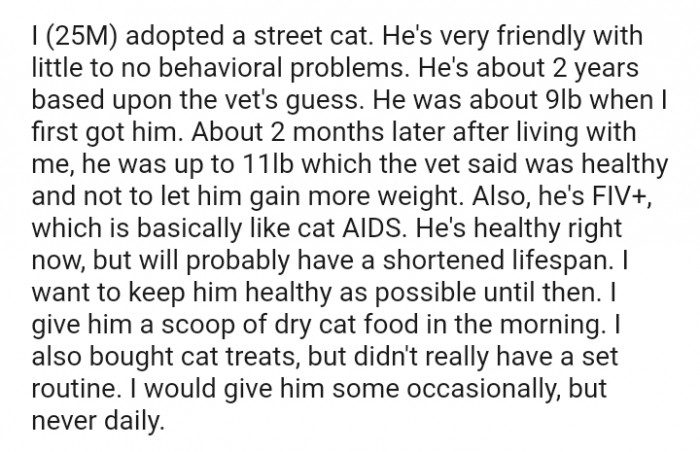
The cat meows at everyone when he wants attention
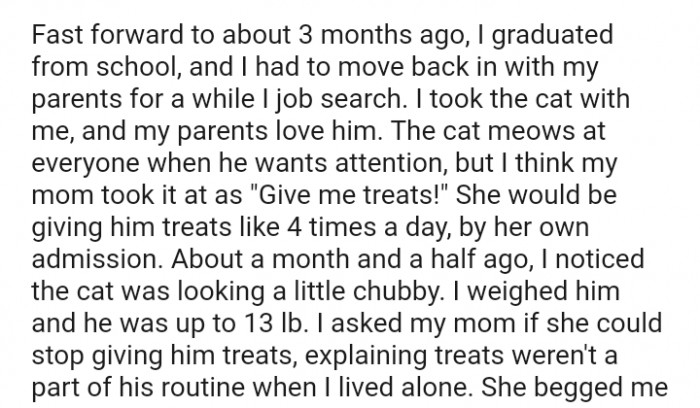
Understanding Pet Ownership Agreements
Dr. Mark Jennings, a behavioral psychologist, notes that agreements about pet care often reflect deeper relational dynamics.
When one party fails to adhere to these agreements, it can lead to feelings of frustration and betrayal.
Research suggests that clear communication and shared responsibilities are essential for harmony in pet ownership.
Understanding Parental Roles
Dr. Rachel Green, a developmental psychologist, emphasizes that parenting agreements are crucial for establishing a harmonious home environment.
In this case, the mother's disregard for the cat's dietary needs could indicate a lack of understanding of the importance of consistent pet care.
Research shows that when parents fail to adhere to agreed-upon rules, it can lead to significant conflict and resentment within the family.
I'm not allowed to give you any more treats
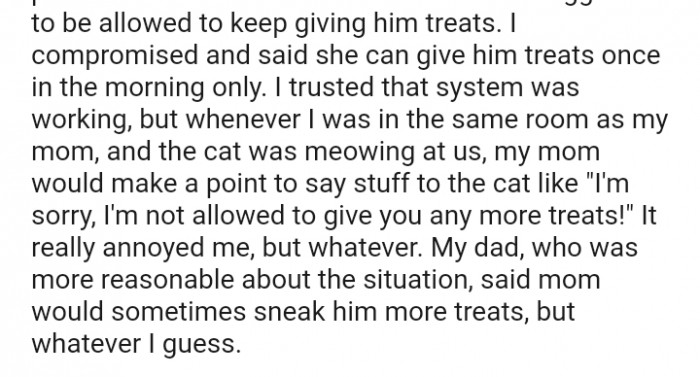
I could hear her from the other room
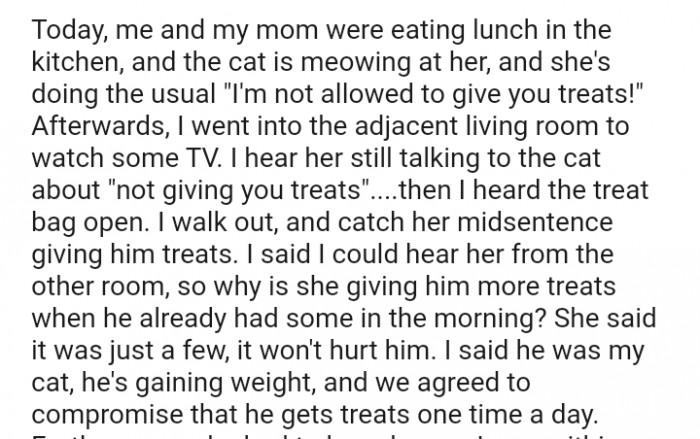
She swears she hasn't been sneaking him treats
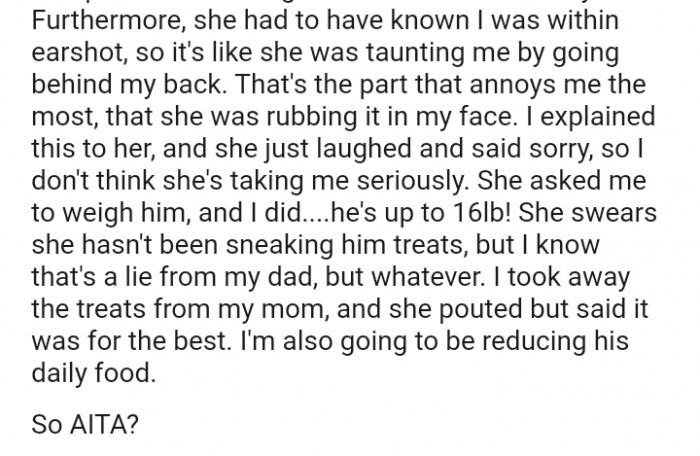
This situation illustrates the importance of accountability in relationships, particularly when it comes to shared responsibilities.
Studies indicate that when individuals do not uphold their end of an agreement, it can create an imbalance that fosters resentment.
Discussing these issues openly can help both parties align their expectations and responsibilities.
According to the Journal of Family Psychology, conflicts over pet care often mirror broader issues of responsibility and respect within relationships.
This situation highlights the necessity for clear communication and adherence to established agreements to avoid misunderstandings.
Understanding the emotional attachment to pets can also clarify why such disagreements are particularly sensitive.
Here are some of the topmost comments from Redditors...
You will have to give him diet food

This Redditor likes the option 2 suggested by the Redditor above
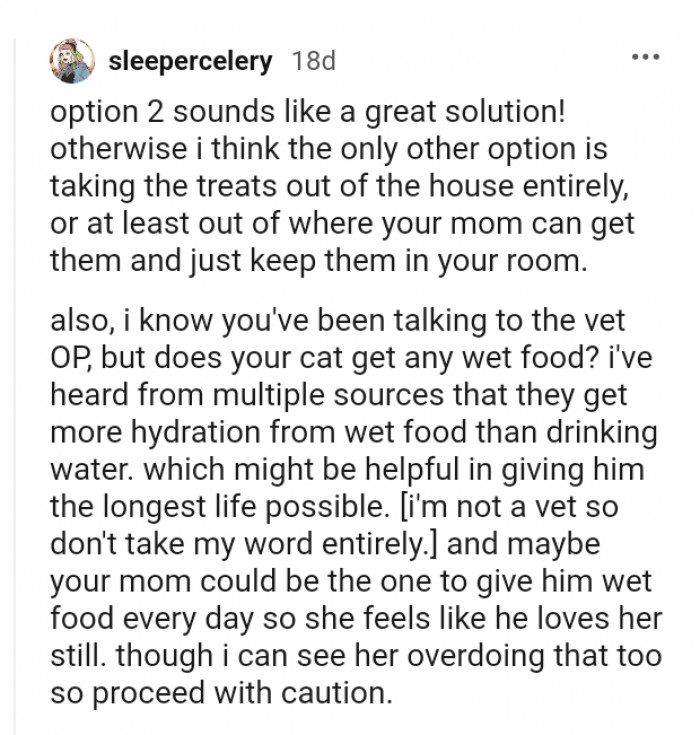
This Redditor also agrees with the second option
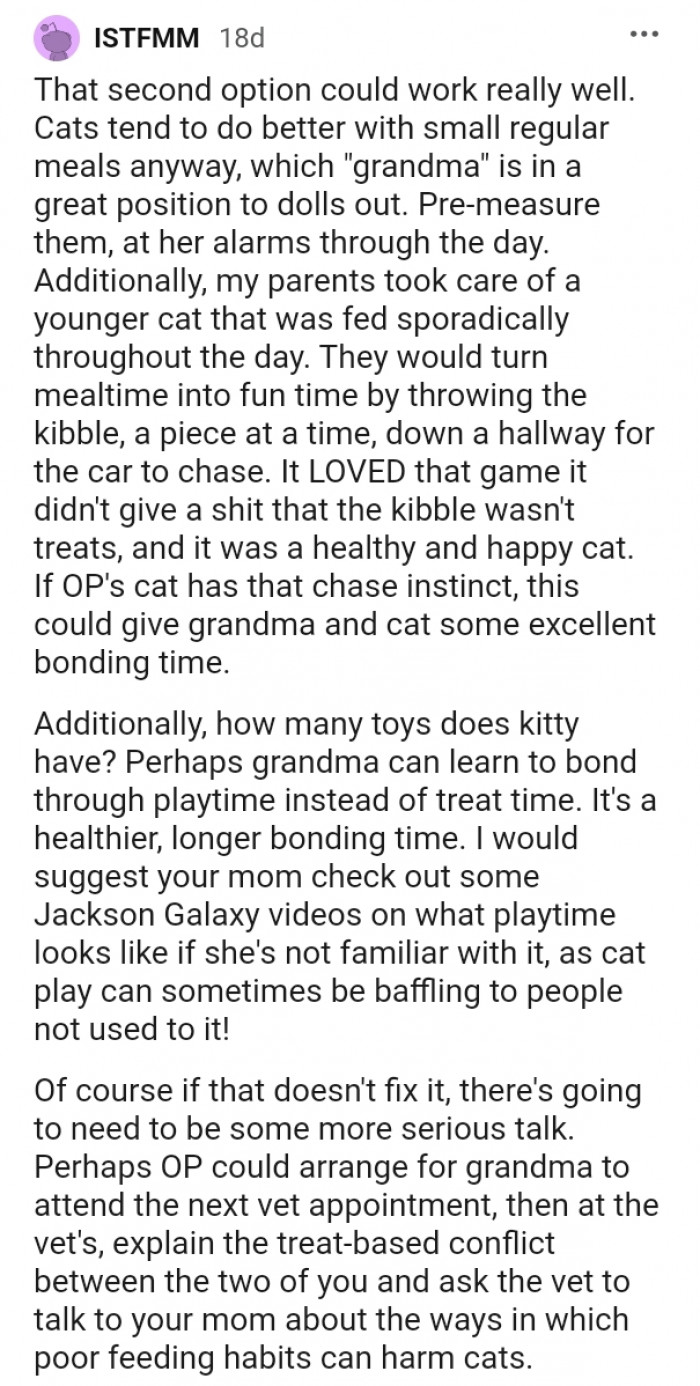
The Emotional Impact of Pet Care
Experts in animal behavior have found that pet ownership can evoke strong emotional responses, particularly when care is not adhered to.
Failure to meet a pet's needs can lead to feelings of guilt and frustration, impacting the mental well-being of the owner.
Recognizing these emotions is crucial for managing care responsibilities effectively.
The Impact of Consistency in Pet Care
Consistency in pet care is essential for both the animal's well-being and the family's emotional health.
Research indicates that pets thrive on routines, and any deviations can lead to behavioral issues or health concerns.
In this case, the mother's actions could contribute to stress for both the cat and the owner.
This Redditor also used some of Jackson Galaxy's techniques
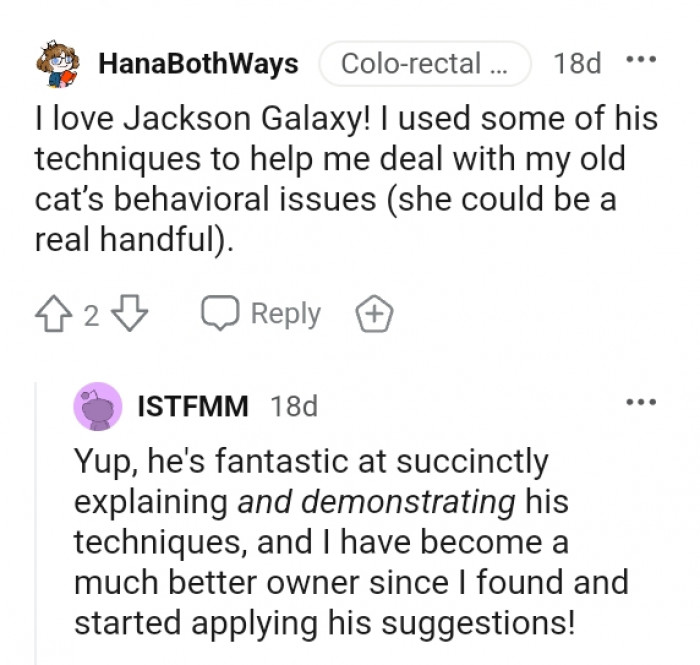
The treats and food are now all on the OP
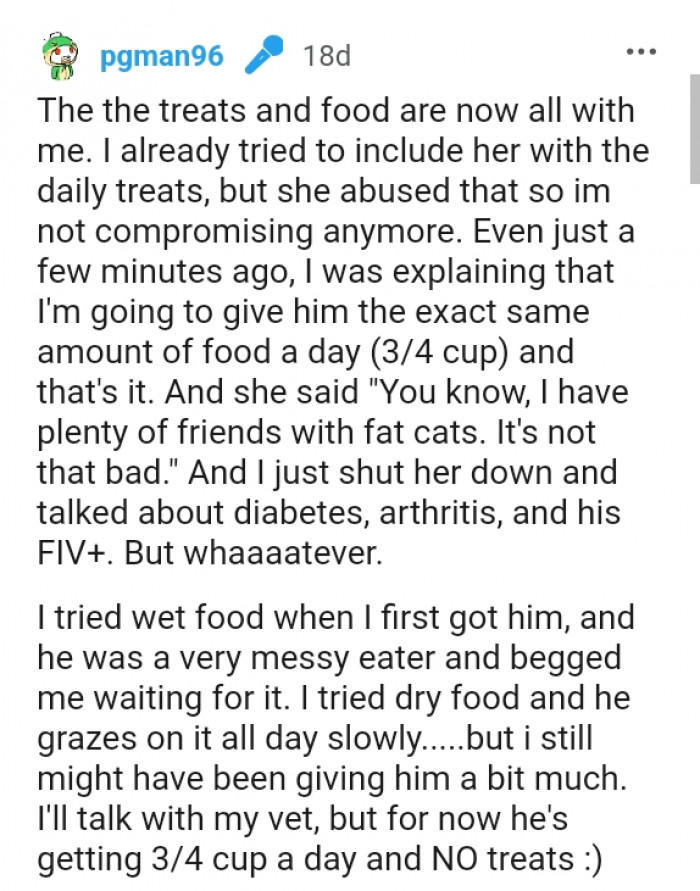
Good for you for taking him in

Moreover, the dynamics of caregiver relationships can influence how individuals respond to perceived neglect.
Research published in the Journal of Animal Psychology suggests that unresolved emotional issues can complicate caregiving roles, leading to conflict.
This highlights the need for emotional awareness and open communication when discussing pet care responsibilities.
Therapists often recommend family discussions about pet responsibilities to foster accountability and cooperation.
Using family meetings to discuss pet care can help clarify expectations and reinforce the importance of following through on commitments.
This approach encourages everyone to participate in creating a nurturing environment for the pet.
This Redditor had to explain to the OP what cat tax means

A lot of people think cats are supposed to be fat
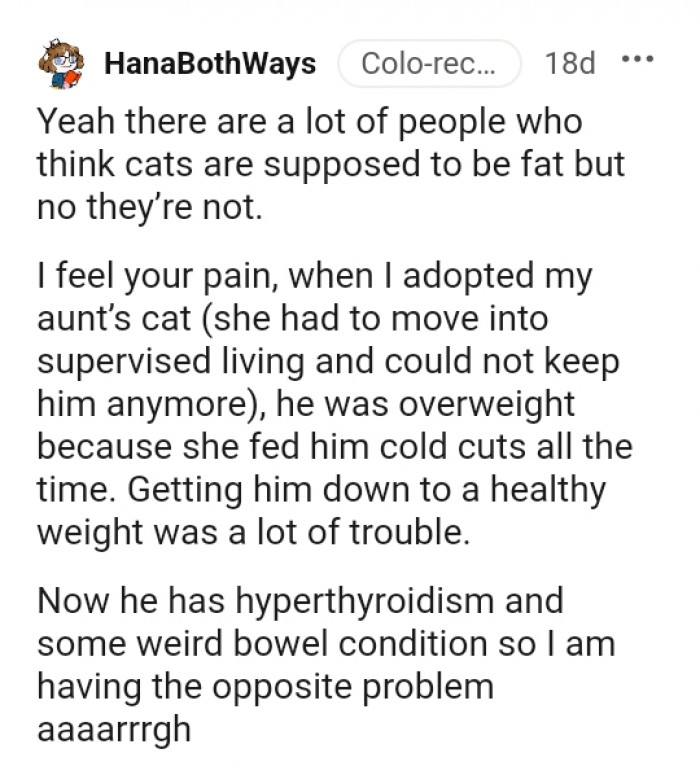
The extra weight shortens their life
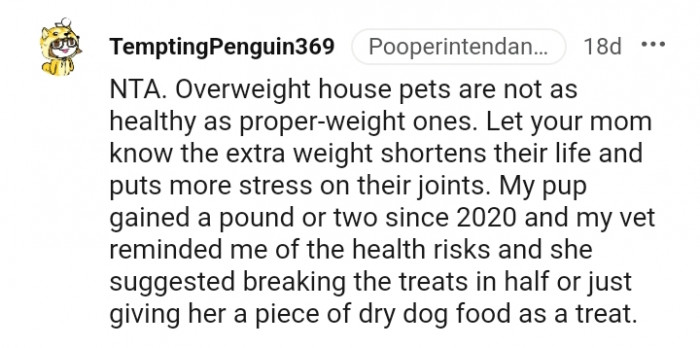
Strategies for Healthy Communication
To address disagreements about pet care, implementing healthy communication strategies can be beneficial.
Experts recommend utilizing 'I' statements to express feelings without placing blame, enhancing the chances of productive conversations.
For instance, saying 'I feel frustrated when the cat is overfed' rather than 'You always overfeed the cat' can lead to more constructive dialogue.
Exploring Emotional Attachments to Pets
Pets often serve as emotional anchors for their owners, providing comfort and companionship.
According to a study published in the Journal of Applied Animal Welfare Science, the emotional bonds formed with pets can significantly impact owners' mental health.
In this context, the owner's frustration with the mother's treatment of the cat reveals a deeper emotional investment in the pet's welfare.
It is abusive to overfeed pets
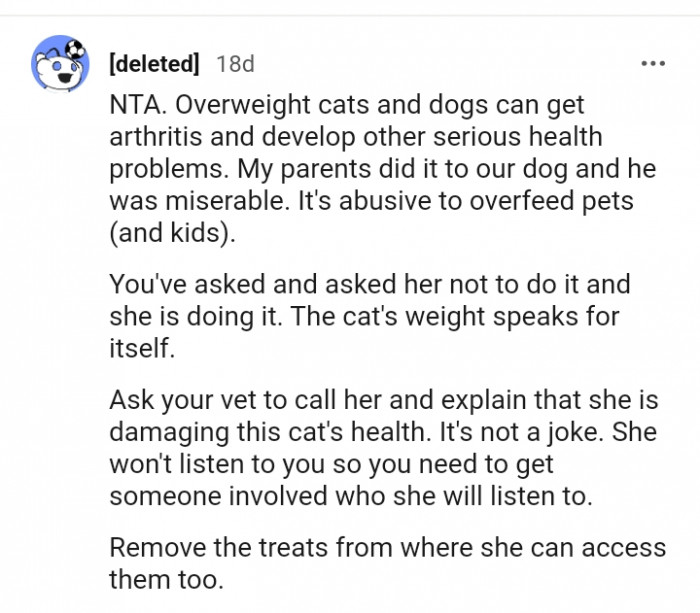
She was intentionally harming and therefore quickening his death

She wants his life span to continue getting shorter

Additionally, setting regular check-ins to discuss pet care can help both parties stay accountable and aligned.
Establishing a routine for discussing responsibilities can reduce resentment and prevent misunderstandings.
Research shows that proactive communication strengthens relationships and fosters a sense of teamwork.
Establishing a pet care plan that includes all family members can promote shared responsibility and reduce conflicts.
Experts recommend creating a chart that outlines each person's role in pet care, ensuring everyone is on the same page.
This can help prevent misunderstandings and foster a cooperative spirit within the family.
Caring more about dopamine than the cat's health
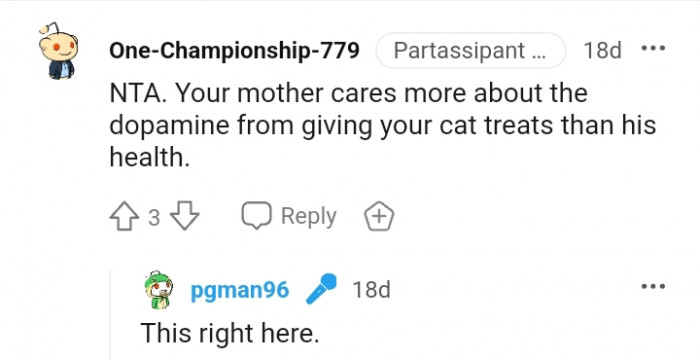
It lessens their quality of life as well as their life span
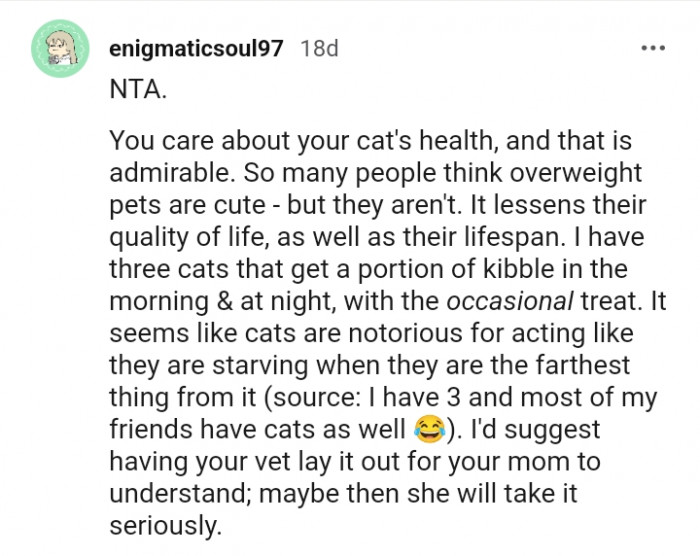
Losing weight may be easier with wet food

Emotional Resilience in Caregiving
Building emotional resilience is vital in caregiving roles, particularly when conflicts arise over responsibilities.
Psychologists emphasize the importance of self-care and emotional management to prevent burnout in pet care.
Recognizing signs of stress and addressing them early can help maintain a positive caregiving environment.
The Importance of Communication in Family Dynamics
Effective communication is critical in family dynamics, particularly when it comes to shared responsibilities.
Studies show that families who engage in open dialogues about expectations tend to experience higher levels of satisfaction and lower levels of conflict.
This suggests that addressing pet care agreements openly can strengthen family relationships.
Due to their high-calorie content, too many cat treats can cause obesity in cats as well as digestive issues like vomiting or diarrhea. In the OP’s case, his cat just kept on adding weight, and it’s just so sad his mom can’t see the damage she’s causing.
What advice would you give the OP? Leave your thoughts in the comments below and share this post as well.
In conclusion, clear agreements and communication about pet care are vital for maintaining harmony within families.
Emphasizing shared responsibilities can help prevent conflicts and enhance the emotional well-being of both pets and their owners.
As research suggests, fostering a culture of accountability and empathy is key to nurturing healthy family dynamics.
Psychological Analysis
This situation highlights the significance of maintaining clear agreements regarding pet care within family structures.
Open discussions about responsibilities can help prevent misunderstandings and strengthen family bonds.
Analysis generated by AI
Analysis & Alternative Approaches
This scenario underscores the importance of clear communication and adherence to agreements in family dynamics.
By working together to establish shared responsibilities, families can create a nurturing environment for both pets and members alike.
Ultimately, fostering accountability and empathy will enhance relationships and reduce conflicts.
Ultimately, navigating the challenges of shared pet care requires patience, understanding, and effective communication.
By fostering an open dialogue about feelings and responsibilities, couples can build a stronger bond while caring for their pets.
Analysis & Alternative Approaches
In summary, effective communication and mutual accountability are essential in managing shared responsibilities in pet care.
Research has shown that addressing emotional dynamics can significantly improve relationships and caregiving experiences.



